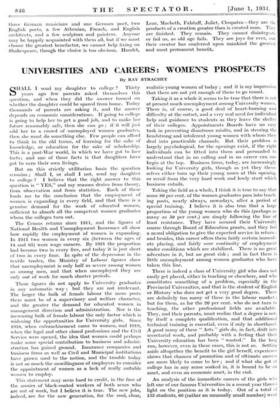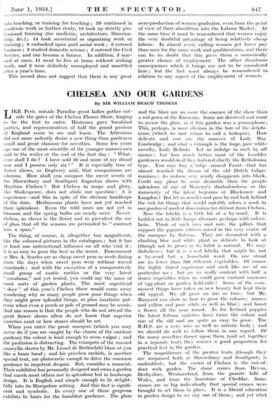UNIVERSITIES AND CAREERS : WOMEN'S PROSPECTS
By RAY STRACHEY
SHALL I send my daughter to college ? Thirty years ago few parents asked themselves this question, and when they did the answer turned on whether the daughter could be spared from home. Today thousands of parents are asking it, and the answer depends on economic considerations. If going to college is going .to help her to get a good job, and to make her future reasonably safe, then she can go ; if it will just add her to a crowd of unemployed women graduates, then she must do something else. Few people can afford to think in the old terms, of learning for the sake of knowledge, or education for the sake of scholarship. This is a post-War world, in which we have got to face facts; and one of those facts is that daughters have got to earn their own livings.
But on this strictly utilitarian basis the question remains ; Shall I, or shall I not, send my daughter to college ? I believe that the right answer to this question is " YES," and my reasons derive from theory, from observation and from statistics. Each of these "leads me to the conclusion that the employment of women is expanding in every field, and that there is a genuine demand for the work of educated women, sufficient to absorb all the competent women graduates whom the colleges turn out.
The Census returns since 1911, and the figures of National Health and UnemployMent Insurance all show how rapidly the employment of women is expanding. In 1911 two women in every six (between the ages of 14 and 65) were wage earners. By 1921 the proportion had become two in every five, and today it is just short of two in every four. In spite of the depression in the textile trades, the Ministry of. Labour figures show that unemployment is only half as severe among women as among men, and that when unemployed they are only out of work for much shorter periods.
These figures do not apply to University graduates in any automatic way ; but they are not irrelevant. The larger the bulk of female labour the more posts there must be of a supervisory and welfare character, and the greater the demand for educated women in management direction and administration. Nor is the increasing bulk of female labour the only factor which is widening the opportunities for University girls. Since 1918, when enfranchisement came to women, and 1919, when the legal and other closed professions and the Civil Service were opened, the idea that women. could perhaps make some special contribution to business and admini- stration has gained ground. Insurance companies and business firms as well as Civil and Municipal institutions have grown used to the notion, and the trouble today is not so much the unwillingness of employers to consider the appointment of women. as a lack of really suitable women to employ.
This statement may seem hard to credit, in the face of the armies of black-coated workers of both sexes who are out of work, but I believe it is true. The new jobs, indeed, are for the new generation, for the cool, clear, realistic young women of today ; and it is my impression that there are not yet enough of them to go round.
Taking it as a whole it seems to be true that there is not at present much unemployment among University women. There is, of course, a good deal of heart-burning and difficulty at the outset, and a very real need for individual help and guidance to students as they leave the shelter of their colleges. Appointments Boards have no easy task in preventing disastrous misfits, and in steering the headstrong and intolerant young women with whom they deal into practicable channels. But their problem is largely psychological, for the openings exist, if the right individuals can be fitted into them and persuaded to understand that in no calling and in no career can one begin at the top. Business firms, today, are increasingly looking for University girls, though as yet they them- selves either turn up their young noses at this opening, or recoil from the very hard work and lowly start which business entails.
Taking the field as a whole, I think it is true to say that some 80 per cent. of the women graduates pass into teach- ing posts, nearly always, nowadays, after a period of special training. I believe it is also true that a large proportion of the young women who do this (perhaps as many as 50 per cent.) are simply following the line of least resistance. They have secured their University course through Board of Education grants, and they feel a moral obligation to give the expected service in return ; and besides, this career offers them fairly certain immedi- ate placing, and • fairly sure continuity of employment under conditions which are stabilized. There is no great adventure in it, but no great risk ; and in fact there is little unemployment among women graduates who have taken this line.
There is indeed a class of University girl who does not easily get placed, either in teaching or elsewhere, and who constitutes something of a problem, especially in the Provincial Universities, and that is the student of English or History who does not get a very good degree. There are definitely too many of these in the labour market ; but for them, as for the 20 per cent. who do not turn to teaching, the other professional fields are available. They, and their parents, must realize that a degree is not, by itself a complete qualification, and that additional technical training is essential, even if only in shorthand. A good many of these " Arts " girls do, in fact, drift into secretarial work, and probably with a feeling that their University education has been " wasted." In the long run, however, even in these cases, this is not so. Setting aside altogether the benefit to the girl herself, experience shbws that chances of promotion and of ultimate success are more likely to come to her ; and if what she got at college has in any sense soaked in, it is bound to be an asset, and even an economic asset, in the end.
An analysis of the immediate careers of the girls who left one of our famous Universities in a recent year throws light on the position as it is today. .Out of a, total of 152 students, 66 (rather an unusually small number) went into teaching, or training for teaching ; 20 continued in academic work or further study, 16 took up strictly pro- fessional training (for medicine, architecture, librarian- ship, &c.) ; 14 took secretarial or organizing work or training ; 8 embarked upon paid social work ; 6 entered business ; 3 studied domestic science ; 2 entered the Civil Service, and one became a farmer. In addition, 5 mar- ried at once, 11 went to live at home without seeking work, and 2 were definitely unemployed and unsettled after a year's time.
This record does not suggest that there is any great over-production of women graduates, even from the pcint of view of their absorbtion into the Labour Market. At the same time it must be remembered that women enjoy the very doubtful advantage of being relatively cheap labour. In almost every calling women get lower pay than men for the same work and qualifications, and there can be no doubt that this gives them a numerically greater chance of employment. The other disastrous consequences which it brings are not to be considered here ; but the fact must always be remembered in relation to any aspect of the employment of women.





































 Previous page
Previous page